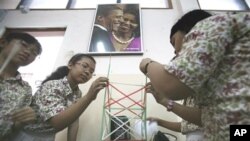While President Barack Obama faces voter dissatisfaction at home, he is sure to receive a warm welcome when he visits Indonesia this month (November 9-10). The president's personal connection to Indonesia has opened the door to improving economic and political ties between two of the largest democracies in the world.
American Peace Corps Volunteer Travis Bluemling teaches English in a farming village more than 800 kilometers from the Indonesian capital of Jakarta. He says even in this remote area, President Obama's popularity makes it easier for him to be accepted in the community.
"One hundred percent. Everyone here knows who President Obama is. I'd say at least 10 times per week I get, 'Obama, you know, he went to school in Jakarta.'"
Anies Baswedan, the president of Paramadina University here, says Indonesians also appreciate how Mr. Obama works to lower tensions between the United States and the Islamic world. They give the president credit, he says, for not giving into domestic political pressures on a range of issues from ending combat operations in Iraq to defending religious freedom for Muslims in America.
"People of Indonesia look at the way he approached Iraq and the way he approached the mosque controversy in New York in a more positive way, very statesman approach. And it is positive," says Baswedan.
When Mr. Obama meets Indonesian President Susilo Bambang Yudhoyono, they will likely focus on mutual security interests. The U.S. plans to resume military training to Indonesia's counter-terrorism force, Kopassus. Some human rights groups are concerned Kopassus has been accused of rights abuses. Washington, however, says closer ties ultimately will improve human rights protections and strengthen democracy here.
Teuku Faizasyah, special assistant to President Yudhoyono, says the U.S.'s new policy of engagement is warranted because of his country's democratic development and growing economic power.
"We can sit at the same height and stand at the same tall [level] because we [are] practicing the similar kind of democracy," says Faizasyah.
In addition to his official meetings, Baswedan hopes Mr. Obama will find time to see old friends and visit children at the school he attended when he lived here with his mother and Indonesian stepfather. Baswedan says ultimately Indonesians see President Obama's visit as a homecoming for a boy who once went to school in Jakarta and went on to become president of the United States.
Obama Indonesia Trip to Highlight Engagement, Personal Connection
- By Brian Padden
















